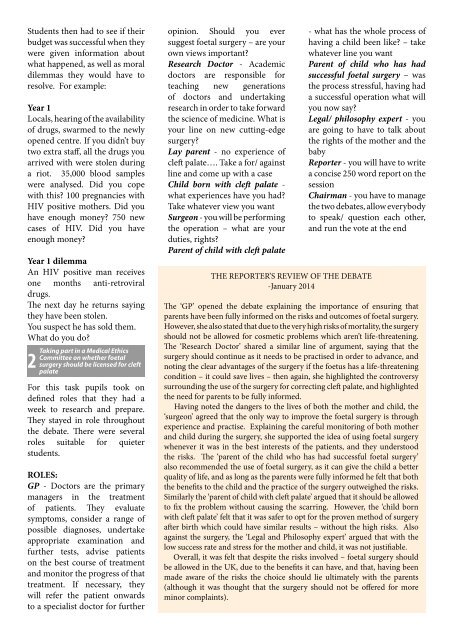Volume 1: November 2014
You also want an ePaper? Increase the reach of your titles
YUMPU automatically turns print PDFs into web optimized ePapers that Google loves.
Students then had to see if their<br />
budget was successful when they<br />
were given information about<br />
what happened, as well as moral<br />
dilemmas they would have to<br />
resolve. For example:<br />
Year 1<br />
Locals, hearing of the availability<br />
of drugs, swarmed to the newly<br />
opened centre. If you didn’t buy<br />
two extra staff, all the drugs you<br />
arrived with were stolen during<br />
a riot. 35,000 blood samples<br />
were analysed. Did you cope<br />
with this? 100 pregnancies with<br />
HIV positive mothers. Did you<br />
have enough money? 750 new<br />
cases of HIV. Did you have<br />
enough money?<br />
Year 1 dilemma<br />
An HIV positive man receives<br />
one months anti-retroviral<br />
drugs.<br />
The next day he returns saying<br />
they have been stolen.<br />
You suspect he has sold them.<br />
What do you do?<br />
Taking part in a Medical Ethics<br />
Committee on whether foetal<br />
2 surgery should be licensed for cleft<br />
palate<br />
For this task pupils took on<br />
defined roles that they had a<br />
week to research and prepare.<br />
They stayed in role throughout<br />
the debate. There were several<br />
roles suitable for quieter<br />
students.<br />
ROLES:<br />
GP - Doctors are the primary<br />
managers in the treatment<br />
of patients. They evaluate<br />
symptoms, consider a range of<br />
possible diagnoses, undertake<br />
appropriate examination and<br />
further tests, advise patients<br />
on the best course of treatment<br />
and monitor the progress of that<br />
treatment. If necessary, they<br />
will refer the patient onwards<br />
to a specialist doctor for further<br />
opinion. Should you ever<br />
suggest foetal surgery – are your<br />
own views important?<br />
Research Doctor - Academic<br />
doctors are responsible for<br />
teaching new generations<br />
of doctors and undertaking<br />
research in order to take forward<br />
the science of medicine. What is<br />
your line on new cutting-edge<br />
surgery?<br />
Lay parent - no experience of<br />
cleft palate…. Take a for/ against<br />
line and come up with a case<br />
Child born with cleft palate -<br />
what experiences have you had?<br />
Take whatever view you want<br />
Surgeon - you will be performing<br />
the operation – what are your<br />
duties, rights?<br />
Parent of child with cleft palate<br />
- what has the whole process of<br />
having a child been like? – take<br />
whatever line you want<br />
Parent of child who has had<br />
successful foetal surgery – was<br />
the process stressful, having had<br />
a successful operation what will<br />
you now say?<br />
Legal/ philosophy expert - you<br />
are going to have to talk about<br />
the rights of the mother and the<br />
baby<br />
Reporter - you will have to write<br />
a concise 250 word report on the<br />
session<br />
Chairman - you have to manage<br />
the two debates, allow everybody<br />
to speak/ question each other,<br />
and run the vote at the end<br />
THE REPORTER’S REVIEW OF THE DEBATE<br />
-January <strong>2014</strong><br />
The ‘GP’ opened the debate explaining the importance of ensuring that<br />
parents have been fully informed on the risks and outcomes of foetal surgery.<br />
However, she also stated that due to the very high risks of mortality, the surgery<br />
should not be allowed for cosmetic problems which aren’t life-threatening.<br />
The ‘Research Doctor’ shared a similar line of argument, saying that the<br />
surgery should continue as it needs to be practised in order to advance, and<br />
noting the clear advantages of the surgery if the foetus has a life-threatening<br />
condition – it could save lives – then again, she highlighted the controversy<br />
surrounding the use of the surgery for correcting cleft palate, and highlighted<br />
the need for parents to be fully informed.<br />
Having noted the dangers to the lives of both the mother and child, the<br />
‘surgeon’ agreed that the only way to improve the foetal surgery is through<br />
experience and practise. Explaining the careful monitoring of both mother<br />
and child during the surgery, she supported the idea of using foetal surgery<br />
whenever it was in the best interests of the patients, and they understood<br />
the risks. The ‘parent of the child who has had successful foetal surgery’<br />
also recommended the use of foetal surgery, as it can give the child a better<br />
quality of life, and as long as the parents were fully informed he felt that both<br />
the benefits to the child and the practice of the surgery outweighed the risks.<br />
Similarly the ‘parent of child with cleft palate’ argued that it should be allowed<br />
to fix the problem without causing the scarring. However, the ‘child born<br />
with cleft palate’ felt that it was safer to opt for the proven method of surgery<br />
after birth which could have similar results – without the high risks. Also<br />
against the surgery, the ‘Legal and Philosophy expert’ argued that with the<br />
low success rate and stress for the mother and child, it was not justifiable.<br />
Overall, it was felt that despite the risks involved – foetal surgery should<br />
be allowed in the UK, due to the benefits it can have, and that, having been<br />
made aware of the risks the choice should lie ultimately with the parents<br />
(although it was thought that the surgery should not be offered for more<br />
minor complaints).<br />
Each cross-curricular teaching and learning team selected a<br />
theme to work on during the academic year and one group<br />
chose to focus on enquiry-based learning. The team met<br />
and discussed the concepts and techniques of enquiry-based<br />
learning and then agreed to try out some techniques in their<br />
classrooms. Each member of the team then contributed an<br />
article to a summary publication. In the summer term the<br />
team presented to the whole staff in a professional skills<br />
meeting and published the booklet, which is available by<br />
clicking the image above.



